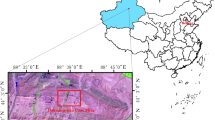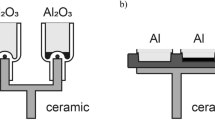Abstract
As a prelude to more general studies on the formation of smoke and soot during the combustion of coals and their distillation products, some observations have been made of the effects of fuel type and mode of combustion on the amount and character of the carbonaceous matter deposited from flames of simple gaseous and liquid fuels. Examination of solvent extracts of the carbonaceous matter has led to the conclusion that it probably contained intermediates in the process of carbon formation, and was formed from the initially simple fuels by a complex process including dehydrogenation and polymerization.
This is a preview of subscription content, access via your institution
Access options
Subscribe to this journal
Receive 51 print issues and online access
$199.00 per year
only $3.90 per issue
Buy this article
- Purchase on Springer Link
- Instant access to full article PDF
Prices may be subject to local taxes which are calculated during checkout
Similar content being viewed by others
References
Parker, W. G., and Wolfhard, H. G., J. Chem. Soc., 2038 (1950).
Arthur, J. R., Nature, 165, 567 (1950).
As measured by the Kurlbaum method, see Lewis, B., and Von Elbe, G., “Combustion Flame and Explosion of Gases”, Chapter 19 (Cambridge, 1938).
Author information
Authors and Affiliations
Rights and permissions
About this article
Cite this article
ARTHUR, J., KAPUR, P. & NAPIER, D. Carbonaceous Deposits from Hydrocarbon Diffusion Flames. Nature 169, 372–373 (1952). https://doi.org/10.1038/169372a0
Issue Date:
DOI: https://doi.org/10.1038/169372a0
This article is cited by
-
Single-pulse real-time billion-frames-per-second planar imaging of ultrafast nanoparticle-laser dynamics and temperature in flames
Light: Science & Applications (2023)
Comments
By submitting a comment you agree to abide by our Terms and Community Guidelines. If you find something abusive or that does not comply with our terms or guidelines please flag it as inappropriate.



